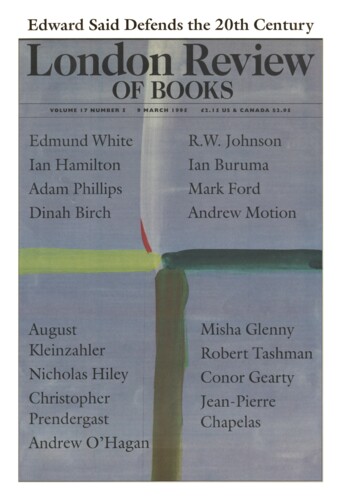The slates have gone
from that shed in the park
where sometimes the old sat
if they were desperate,
and sometimes the young
with nowhere better to fuck,
and now given some luck
the whole piss-stinking thing
will fall to the ground,
no, I mean
will lift into space,
no evidence left
in its earthly place
of the grey graffiti runes,
the deck of glue,
the bench with broken ribs,
where if things had been different
I might have sat, or you.
This moral won’t do.
Think of Goethe who
all those centuries back
found a pure space like that,
his bench an oak tree trunk,
his view
a plain of ripening wheat
where retriever-dog winds
in a clear track
raced forwards and back
laying a new idea at his feet
again and again,
again and again,
but not one the same,
until he was stuffed full
as one of those newfangled air-balloons
and floated clear
into a different stratosphere.
The oak tree stayed,
its reliable trunk
making light of the sun,
its universe of leaves
returning just as they pleased
each spring, so life begun
was really life carried on,
or was
until a lightning bolt
drove hell-bent
through the iron bark
and split the oak in two.
This moral still won’t do.
You see
one crooked piece of tree
broke free,
escaped the fire, and found its way
into the safe hands of a carpenter.
This man, he liked a shed.
(I should explain:
two hundred years have gone
since Goethe saw
the future run towards him
through the wide wheat plain.)
That’s right; he liked a shed.
He liked the way a roof
could be a lid
and shut down heavily
to make a box,
a box which locked
so no one saw inside
the ranks
of gimcrack bunks,
or heard things said
by shapes that lay on them
with shaved heads,
not even him.
He just made what was ordered
good and sure,
saw everything was kept
the same, each nail,
each duckboard floor,
except, above one door
in pride of place
he carved his bit of tree,
not thinking twice,
into a face,
a merry gargoyle grimace.
This moral still won’t do.
It’s after dark,
and on my short-cut home to you
across the park
I smell the shed
before I see it: piss and glue
and something like bad pears,
and yet,
next thing I know
I’ve stepped inside it,
sat down on the bench
(it isn’t pears, it’s shit)
and stared up through
its rafters at the stars –
their dead and living lights
which all appear
the same to me,
and settle equally.
Send Letters To:
The Editor
London Review of Books,
28 Little Russell Street
London, WC1A 2HN
letters@lrb.co.uk
Please include name, address, and a telephone number.

